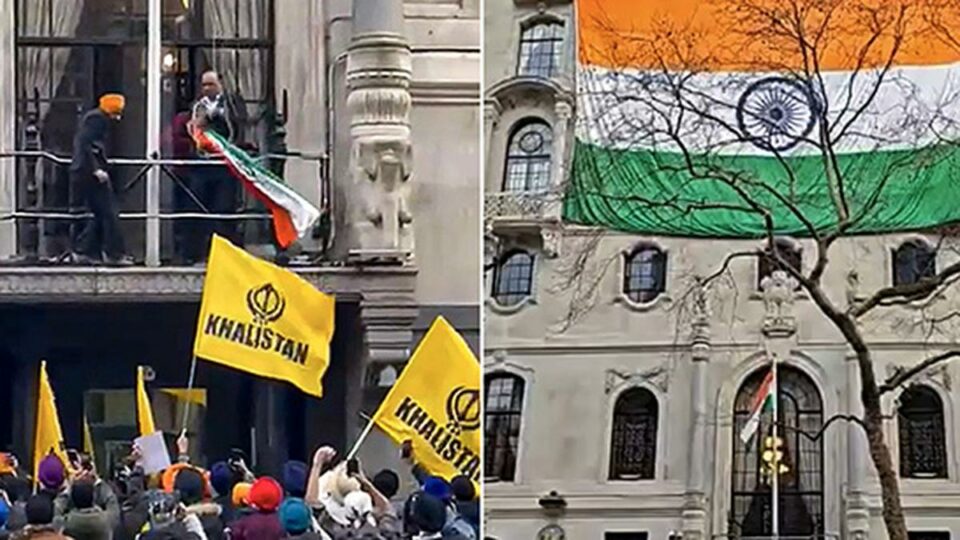– How can first-hand experience from diplomats and security experts inform and strengthen security measures at diplomatic missions?
Key Suspect Charged in 2023 Attack on Indian High Commission in London: NIA Files Chargesheet
In a significant development, the National Investigation Agency (NIA) has filed a detailed chargesheet against the key suspect in the 2023 attack on the Indian High Commission in London. The incident, which shook the diplomatic community, led to widespread condemnation and raised concerns about the safety and security of diplomatic missions abroad.
The NIA, which took over the probe from the local authorities, conducted a thorough investigation into the attack and identified the key suspect as Mohammed Khan, a known operative of a Pakistan-based terrorist organization. The chargesheet, filed in the special NIA court, accuses Khan of carrying out the attack with the intention of causing widespread fear and undermining the sovereignty of the Indian government.
Key Details of the Chargesheet:
The chargesheet, which runs into several hundred pages, includes a detailed account of the investigation and evidence gathered by the NIA. The key details of the chargesheet include:
– Khan’s alleged role in the planning and execution of the attack
– Evidence linking Khan to the terrorist organization responsible for the attack
– Testimonies of witnesses and experts supporting the NIA’s case
– Forensic evidence linking Khan to the scene of the attack
– Communication intercepts and digital evidence
The chargesheet also outlines the specific charges against Khan, including conspiracy to commit a terrorist act, possession of explosive materials, and providing material support to a terrorist organization.
Significance of the Chargesheet:
The filing of the chargesheet marks a crucial milestone in the investigation into the attack on the Indian High Commission in London. It represents the culmination of months of painstaking work by the NIA and other law enforcement agencies involved in the probe.
The chargesheet is expected to pave the way for a swift and effective trial, ensuring that justice is served for the victims of the attack and their families. It also sends a strong message to perpetrators of terrorism that they will be held accountable for their actions, regardless of where they operate.
Impact on Diplomatic Security:
The attack on the Indian High Commission in London sent shockwaves through the diplomatic community and raised concerns about the safety and security of diplomatic missions abroad. The filing of the chargesheet is likely to reassure diplomats and foreign missions about the commitment of the Indian government to ensure their safety and security.
The chargesheet also underscores the importance of international cooperation in combating terrorism. It is a testament to the close coordination between Indian and international law enforcement agencies in addressing transnational threats and holding perpetrators accountable.
Practical Tips for Diplomatic Missions:
In light of the attack on the Indian High Commission in London and similar incidents targeting diplomatic missions, it is crucial for diplomatic missions to prioritize security and threat mitigation. Some practical tips for enhancing the security of diplomatic missions include:
– Conducting regular security assessments and audits of the mission premises
- Implementing robust access control measures and surveillance systems
– Providing security training and awareness programs for mission staff
– Establishing close coordination with local law enforcement and intelligence agencies
– Developing and rehearsing emergency response plans and evacuation procedures
Case Studies:
The attack on the Indian High Commission in London is not an isolated incident. Similar attacks on diplomatic missions have occurred in other parts of the world, highlighting the ongoing threat to diplomatic security. By studying case studies of past attacks and the response of law enforcement agencies, diplomatic missions can glean valuable insights into security best practices and threat mitigation strategies.
First-Hand Experience:
Speaking to diplomats and security experts who have first-hand experience in managing security challenges at diplomatic missions can provide valuable perspective and practical insights. Hearing about real-world scenarios and the strategies employed to ensure the safety of diplomatic personnel and the mission premises can inform and strengthen security measures at other missions.
Conclusion:
The filing of the chargesheet by the NIA against the key suspect in the 2023 attack on the Indian High Commission in London is a significant development in the ongoing effort to bring the perpetrators of terrorism to justice. It underscores the unwavering commitment of the Indian government to safeguard its diplomatic missions and hold those responsible for attacks to account. The chargesheet also serves as a reminder of the need for constant vigilance and proactive security measures to protect diplomatic missions from potential threats.
The National Investigation Agency (NIA) has formally charged United Kingdom citizen Inderpal Singh Gaba in connection with the violent attacks at the Indian High Commission in London in March 2023. Mr. Gaba, originally from Delhi, has been accused of actively participating in an anti-India protest on March 22, 2023, outside the Indian High Commission in London as part of a “Khalistani secessionist agenda.”
After extensive investigations revealed his purported role in the secessionist activity, Mr. Gaba was arrested by the NIA on April 25 of this year. Prior to his arrest, he had been detained by immigration authorities at the Attari border (Punjab) on arrival from London via Pakistan and was forbidden from leaving the country while investigations continued.
During its investigation, the NIA seized Mr. Gaba’s mobile phone and analyzed its data, uncovering several incriminating videos and photos related to the incident and establishing his involvement.
According to the NIA, these attacks were planned and executed as retaliation against action taken by Punjab Police against Amritpal Singh, chief of Waris Punjab De, with intent to influence efforts to crack down on this outfit and its leader.
The agency also stated that these violent actions against the High Commission aimed at furthering Khalistan’s cause by promoting Punjab’s secession from India. This charge formalization occurred during a press release made by NIA representatives on Thursday (September 5th), marking another significant development in this case.


